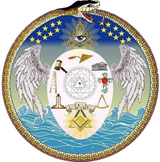Search Results
7/8/2025, 11:49:13 PM
>>509867250
>At the time of the 1848 revolutions, Mazzini was living in exile in England. According to the Grand Commander of Scottish Rite Freemasonry in America, Mazzini was the first head of modern Freemasonry in Italy (...) both Mazzini and Garibaldi were (possible) members of a Masonic revolutionary lodge in London called LES PHILADELPHES. This lodge is said to have worked a new atheistic form of the Rite of Memphis, the “Reformed Rite of Memphis”
>LES PHILADELPHES is believed to be Karl Marx’s lodge, his brothers including Blanc, Garibaldi, and Mazzini
>Giuseppe Garibaldi viewed Freemasonry as a political organization and “took no direct interest in the Craft.” This statement is, of course, made by regular Freemasons. These Masons forget that Freemasonry and politics walked of equal step at the time. Mazzini and Garibaldi were Carbonarists. They re-organized the Carbonari movement to which they added the high degrees of Egyptian Masonry
>Official masonry in France was never a factor in the formation and development of the First International. But in the France of the Second Empire there existed not only the official masonry recognized by the government, but also an underground masonic movement, persecuted by the government because it sought the revolutionary overthrow of the Empire. The role of these undercover, government-persecuted masons in the forming and developing of the First International was enormous.
>We now know the names of approximately 100 members of their principal lodges; these lodges operated in England, and brought together primarily, but not exclusively, French emigres. These materials, together with the émigré publications of the period, make it possible for us to begin to understand the history of these masons, the political activities of their leaders, and their relation to the First International. It is important to determine the nature of these groups, which for the sake of brevity we are calling revolutionary masonry.
>At the time of the 1848 revolutions, Mazzini was living in exile in England. According to the Grand Commander of Scottish Rite Freemasonry in America, Mazzini was the first head of modern Freemasonry in Italy (...) both Mazzini and Garibaldi were (possible) members of a Masonic revolutionary lodge in London called LES PHILADELPHES. This lodge is said to have worked a new atheistic form of the Rite of Memphis, the “Reformed Rite of Memphis”
>LES PHILADELPHES is believed to be Karl Marx’s lodge, his brothers including Blanc, Garibaldi, and Mazzini
>Giuseppe Garibaldi viewed Freemasonry as a political organization and “took no direct interest in the Craft.” This statement is, of course, made by regular Freemasons. These Masons forget that Freemasonry and politics walked of equal step at the time. Mazzini and Garibaldi were Carbonarists. They re-organized the Carbonari movement to which they added the high degrees of Egyptian Masonry
>Official masonry in France was never a factor in the formation and development of the First International. But in the France of the Second Empire there existed not only the official masonry recognized by the government, but also an underground masonic movement, persecuted by the government because it sought the revolutionary overthrow of the Empire. The role of these undercover, government-persecuted masons in the forming and developing of the First International was enormous.
>We now know the names of approximately 100 members of their principal lodges; these lodges operated in England, and brought together primarily, but not exclusively, French emigres. These materials, together with the émigré publications of the period, make it possible for us to begin to understand the history of these masons, the political activities of their leaders, and their relation to the First International. It is important to determine the nature of these groups, which for the sake of brevity we are calling revolutionary masonry.
Page 1
